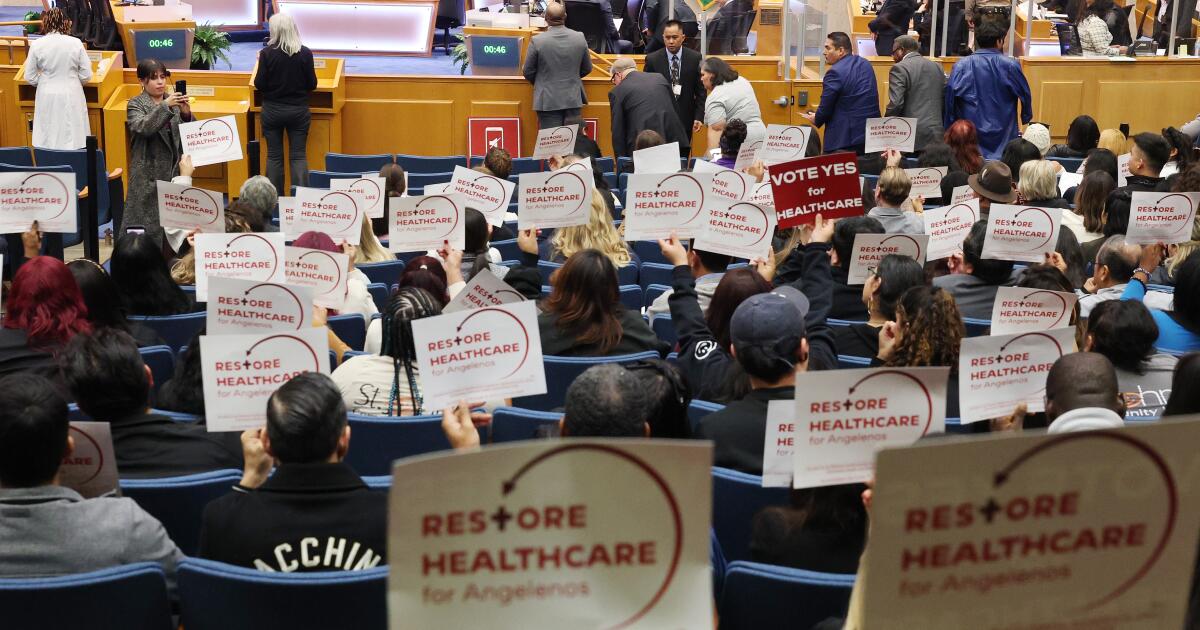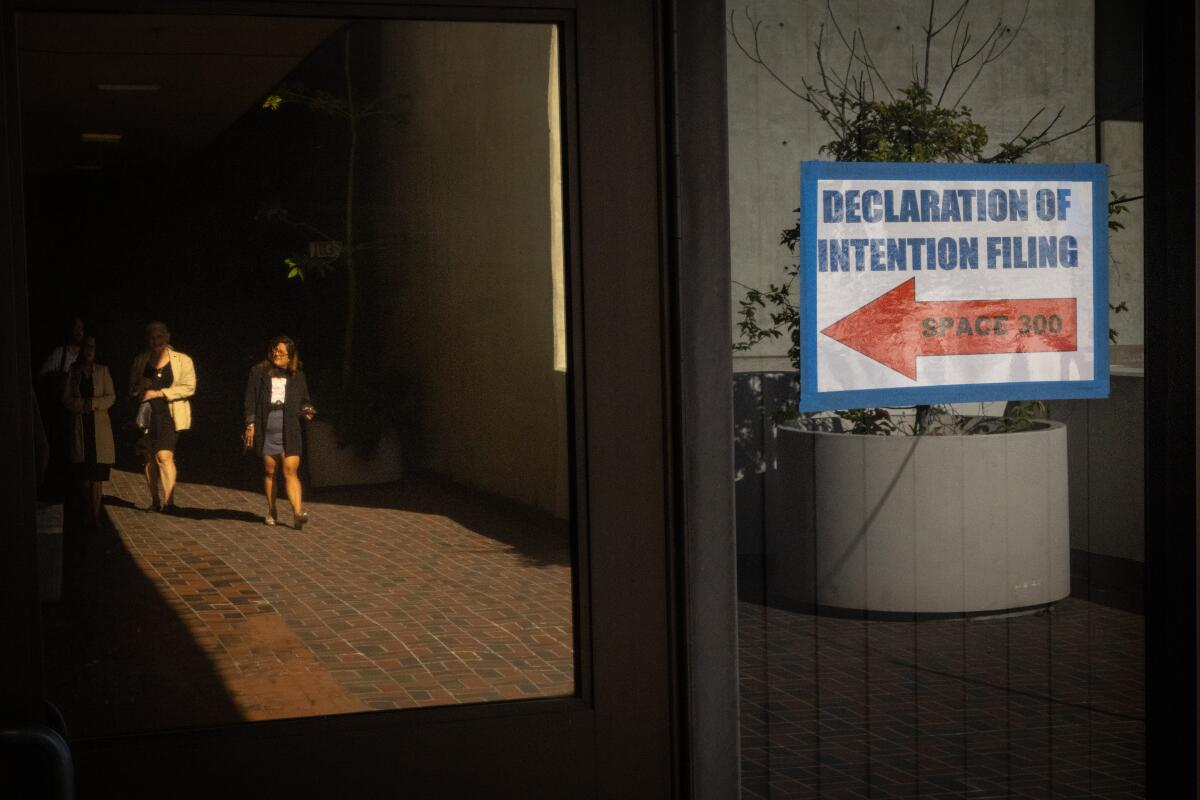A new wedge issue appears in L.A. City Council races
Good morning, and welcome to L.A. on the Record — our City Hall newsletter. It’s Noah Goldberg, with an assist from David Zahniser and Sandra McDonald, giving you the latest on city and county government.
There was a brief discussion on the L.A. City Council floor, with hardly any disagreement, before a motion brought by Councilmember Monica Rodriguez passed on Tuesday.
Rodriguez wants to allow city officials to enter hillside properties in “Very High Fire Hazard Severity Zones,” even without an owner’s permission, to clear hazardous materials and homeless encampments. The goal is to stop encampment fires that could grow into wildfires.
Councilmembers Hugo Soto-Martínez and Ysabel Jurado voted against the proposed change to the city’s municipal code, citing details they wanted addressed, but said they agreed with its spirit.
A third councilmember, Eunisses Hernandez, also voted against the measure, though she did not speak during the meeting.
The political implications of the seemingly routine vote could play out more bitterly over the next several months as Soto-Martínez and Hernandez, both members of the council’s four-person “progressive bloc,” run for reelection in their districts, which include fire-prone hillsides.
The proposal could become another wedge issue on homelessness for the two members, just as the city’s controversial anti-encampment law, Municipal Code section 41.18, was in the 2022 election.
That year, it was Soto-Martínez and Hernandez who were running against incumbents and took a progressive stance against 41.18, which allows council members to designate areas near schools, libraries, senior centers and other sensitive areas as no-camping zones. The two said they believed the law was ineffective at solving homelessness, merely shuffling people around without addressing the root issues.
Now, as the two council members defend their seats, Rodriguez’s proposal has already spurred similar attacks from would-be incumbent-busters.
Maria Lou Calanche, a nonprofit leader seeking to unseat Hernandez in District 1, lives in a “Very High Fire Hazard Severity Zone” at the bottom of a hill by Debs Park. The area is full of dry brush, and Calanche said in an interview that parts of the park catch fire every summer.
“The council district has a lot of hillside property and open space. Debs Park has encampments in it that have not been cleared and that’s public property,” said Calanche, who formerly served on the city Police Commission. “I’m concerned that the current council member puts ideology over the safety of the citizens and residents.”
Calanche said she would consider highlighting Hernandez’s “no” vote on campaign mailers.
“This is such a simple way to make a difference,” Calanche said. “It just seems incredible they would not be supportive.”
Hernandez said she is open to supporting Rodriguez’s proposal but that it fails to define the type of hazard that would allow city officials to enter private property without permission.
“When you expand government authority without tight definitions and guardrails, you end up with inconsistent enforcement and expensive lawsuits,” she said in a statement.
She said she hopes to work with the city attorney’s office, Fire Department and others to make sure the policy is “precise, intentional, legally sound and actually focused on reducing fire risk.”
In District 13, Dylan Kendall, a nonprofit founder and entrepreneur who is running against Soto-Martínez, said she supports the “common-sense” proposal and that her opponent’s vote was “irresponsible.”
The district, which stretches from Hollywood to Atwater Village, includes high fire-risk areas like Elysian Heights and parts of Silver Lake.
“We know what [firefighters are] seeing on the ground: encampments on or adjacent to private property with exposed wiring, pressurized fuel canisters and dense vegetation, and a maze of legal questions about who controls the site when they respond to a call,” she said in a statement. “If a private owner cannot or will not remove combustible materials and encampments that clearly increase wildfire risk, the city should be able to step in, clear the danger.”
Before Tuesday’s vote, Soto-Martínez said he would have supported the proposal had it included a definition of what exactly a fire hazard is, making the same point that Hernandez later did.
Soto-Martínez had supported Rodriguez’s initial proposal at the council’s Public Safety Committee, which was to ask for a report on what municipal code changes would be needed.
But on Tuesday, Rodriguez amended her motion to go straight to the city attorney’s office to change the municipal code. She said she wanted to accelerate the change because of the importance of preventing encampment fires.
Soto-Martínez also expressed an underlying concern that echoed his earlier statements about 41.18, which he fiercely opposed.
“What I don’t want to see is this being used as a tool to push homeless folks from one side of the street to the other side of the street,” he said.
Notably, Councilmember Nithya Raman, who is running for mayor against incumbent Karen Bass, voted in favor of Rodriguez’s motion.
“The problem that this motion is identifying — gaining permission to access private property in Very High Fire Severity Zones — is one that needs to be resolved to ensure that we are mitigating the risk for a serious fire to our fullest capacity,” Raman, who opposed 41.18 and is a member of the council’s progressive bloc along with Jurado, said in a statement.
Former Councilmember Mike Bonin, who runs the Pat Brown Institute for Public Affairs at Cal State LA, said the hillside encampment issue is less clear-cut than 41.18 but could still prove to be divisive.
“This is the kind of thing political consultants salivate over,” he said. “It’s an example of taking an issue that even from the council debate seemed to appreciate the shades of gray and making it black and white.”
State of play
— KARATE KAREN: Bass said at a rally in Leimert Park on Sunday that she is ready to fight off a challenge from Raman, invoking her training in karate to remind Angelenos that she is not too nice to battle. “I was trained to fight physically,” she said, stooping into a bow. “But if you know the martial arts, you know to bow before you kill somebody. You know to smile to throw them off.”
The mayor said she was joking, adding, “But seriously, we know how to fight and we know how to organize.”
— SCHOOL LAYOFFS: The Los Angeles Unified School District board — confronted with deficit spending and a forecast of insolvency in three years — narrowly voted to send out 3,200 notices of possible layoffs. The move, which is ultimately expected to result in 657 job cuts, is strongly opposed by labor unions as unnecessary and harmful to students.
— UCLA AX: UCLA fired its chief financial officer, Stephen Agostini, saying he inaccurately described the school’s budget deficit. The termination comes after Agostini told the school newspaper, the Daily Bruin, that “financial management flaws and failures” predating his arrival led to a $425-million deficit. The school claimed his comments were inaccurate.
— PRESSURE ON WASSERMAN: Casey Wasserman faced more calls to step down as chair of the 2028 Los Angeles Olympics over racy emails with convicted sex Ghislaine Maxwell from decades ago. Bass, along with some gubernatorial candidates, was among those joining the chorus.
“My opinion is that he should step down,” Bass said in a CNN interview.
— STRICTLY BUSINESS: A coalition of business and hotel industry leaders submitted more than 79,000 signatures in support of a measure to repeal the gross receipts tax on L.A. businesses. The measure, proposed for the November ballot, would punch an $800-million hole in the city budget if approved by voters.
— WRITE IT RIGHT: Angelenos hoping to write arguments for or against three city ballot measures — dealing with cannabis and hotel taxes — can apply by Friday with the office of Council President Marqueece Harris-Dawson. The arguments will be published in the Voter Information Pamphlet mailed out before the June 2 election.
— PUSHING FOR PARK: The union that represents rank-and-file police officers is putting $278,000 into efforts to reelect Councilmember Traci Park, according to a filing submitted to the city’s Ethics Commission. The money from the Los Angeles Police Protective League will go toward polling and canvassers in Park’s coastal district.
— SLAP ON THE WRIST: City Council candidate Jose Ugarte, who is running to replace his boss Curren Price in District 9, has agreed to pay $25,000 for committing a city ethics violation. Ugarte admitted that on his financial interest forms, he failed to disclose a consulting firm he owns and income he made. He has called it a “clerical reporting error.”
QUICK HITS
- Where is Inside Safe? The mayor’s signature program was in Skid Row in Councilmember Ysabel Jurado’s district providing assistance to homeless people during the heavy rains this week.
- On the docket next week: The Charter Reform Commission will meet Thursday to address City Council expansion, ranked choice voting, mayoral powers and more.
Stay in touch
That’s it for this week! Send your questions, comments and gossip to LAontheRecord@latimes.com. Did a friend forward you this email? Sign up here to get it in your inbox every Saturday morning.





